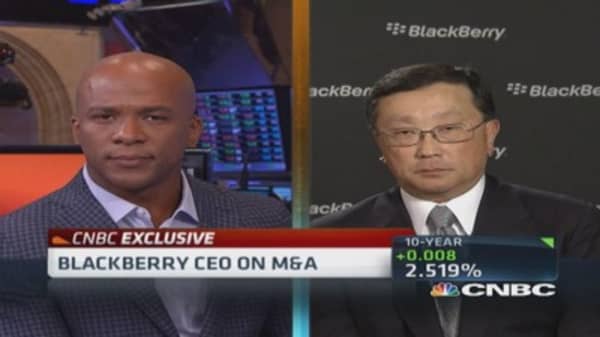Last week's launch of our new BlackBerry Passport handset provides a clear indication of BlackBerry's singular focus: We are innovating mobile technology for serious users who care about serious productivity.
From those who get what we do – and there are many – the feedback so far has been excellent. Our core audience is excited to see a smartphone geared not just to their desires, but to their needs. For those who don't get BlackBerry Passport or blithely write it off as "weird," we'll give them some time to come around. We know that different isn't always easy, but we do know it's the only way to stand out.
Read More Will new devices help BlackBerry?
And, in that sense, BlackBerry Passport sets the tone for what we do and how we do it. We don't expect to sell a handset to everyone and don't expect to take down the consumers who love to play games on their iPhones. But we do want to provide an experience that caters to the mobile professional – anyone who relies on their device to do their jobs. As I like to say, most smartphones are better designed for helping users kill time than making the most of it.
Innovations with the BlackBerry Passport focus on things that matter: advances in battery life, an innovative screen, a multi-function keyboard and seamless synchronization of contacts and documents across devices, and aggregation of all messages (email, text, social, etc.) into one actionable hub.
What also matters is the innovation that goes beyond just the device. BlackBerry Blend, debuting first on the BlackBerry Passport, does that by seamlessly allowing access to documents, messages, email, contacts and more across any device on any other operating system, including iOS and Android. It sounds like a simple concept, but it becomes a powerful tool for those who always need access to their data – securely.
So when a BlackBerry Passport user does finally get to her desk, she can pull up the spreadsheet she's been crunching on her handset and easily switch to her desktop screen and send it to her colleagues.
Those may not inspire the masses to line up at midnight but, for users who burn the midnight oil, those features are essential to achieving the results they desire every day. These are the people for whom BlackBerry Passport is designed – and those are the people BlackBerry is staking our future on.
So we are listening closely to them.
Over the summer, for example, BlackBerry (in collaboration with research firm GfK) surveyed more than 9,500 people around the world who use their smartphones on the job. The project offered a great chance to gain deeper insight into the features and functions ambitious professionals need and want in their mobile devices.
Read MoreBlackBerry CEO: Reports of our phones' death are greatly exaggerated
The survey showed that nearly 70 percent of respondents are always looking for ways to improve their productivity and be more efficient. That's not surprising, considering the average professional smartphone user estimates mobility saves five hours a week by giving them the flexibility to work where and when they want and to always be within reach.
But smartphones designed for mass audiences often come up short for professional use. The biggest needs cited by our survey respondents: security, battery life and durability. The biggest barriers: battery life, connectivity and ease of typing.
The paltry battery life of most smartphones is not surprising, as anyone who's ever tried to find an open outlet in an airport knows all too well. What was surprising to me, however, was that battery life ranked dead even with security at the top of business users' needs; 71 percent said they need their work device to be secure and the same percentage said they need it to stay charged at the end of a long day. More than a third complained that an inferior typing experience hindered their ability to be productive.
Read MoreBlackBerry CEO: Here's our new strategy
Security, battery life and typing – those have always been BlackBerry differentiators and they are the core competencies professional users still expect from their devices. And let's be honest: Most smartphones on the market are inadequate at meeting various (and sometimes all) of those basic technical needs.
Not so easily tested by reviewers, though, was security. But for us, that's a given. It's why our end-to-end solution is the only mobile platform to earn the highest level of approval for use by the Defense Department, and why we're trusted by the most powerful governments and leaders around the world.
Ultimately, what our research told us is that there's a pronounced need for a different kind of thinking about mobile devices that help professionals drive change. As we turn around our business – and our latest results show that we're making great progress – the mobile professional is where we are staking our claim.
A lot has been written about BlackBerry Passport's unique form factor. Form follows function and the function of BlackBerry Passport is to help busy professionals make time, not kill it. So while BlackBerry Passport stands out in a crowded field of generic clones, we'd like to think BlackBerry helps our users stand out, too.
John Chen is chief executive officer of BlackBerry and executive chair of the company's board of directors. Follow BlackBerry on Twitter at@BlackBerry4Biz.





